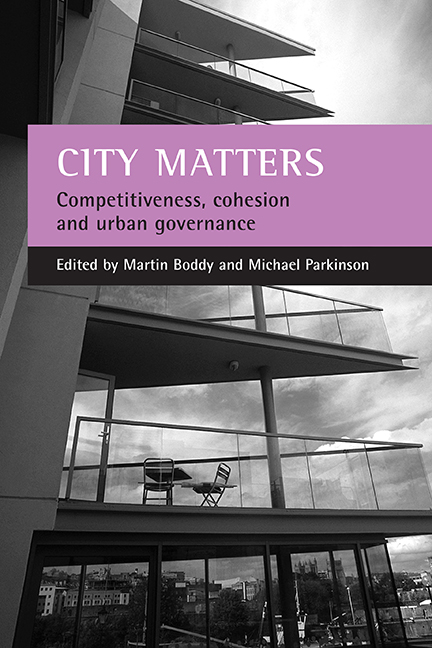Book contents
- Frontmatter
- Contents
- List of tables and figures
- Foreword
- Acknowledgements
- Notes on contributors
- one Introduction
- Part One Competitiveness, cohesion and urban governance
- Part Two Competitiveness and urban change
- Part Three Competitiveness, innovation and the knowledge economy
- Part Four Housing, property and economic performance
- Part Five Space, place and social cohesion
- Part Six Ethnicity, enterprise and social cohesion
- Part Seven Leadership, governance and social capital
- Conclusions
- Index
thirteen - Does spatial concentration of disadvantage contribute to social exclusion?
Published online by Cambridge University Press: 20 January 2022
- Frontmatter
- Contents
- List of tables and figures
- Foreword
- Acknowledgements
- Notes on contributors
- one Introduction
- Part One Competitiveness, cohesion and urban governance
- Part Two Competitiveness and urban change
- Part Three Competitiveness, innovation and the knowledge economy
- Part Four Housing, property and economic performance
- Part Five Space, place and social cohesion
- Part Six Ethnicity, enterprise and social cohesion
- Part Seven Leadership, governance and social capital
- Conclusions
- Index
Summary
Background and objectives
People assume as a matter of common sense that place matters. Estate agents assert that location is the prime attribute of a house in determining its price. Government policy and resources are targeted to particular areas on the basis that concentrating resources in this way will have the greatest pay-off. However, when it comes to considering the influence of space and place on the life chances of individuals, it is much less clear precisely why space should matter, or for what outcomes it is particularly important. It is far from clear how much spatial variations actually matter for outcomes, for example, compared with personal characteristics.
The aim of the research discussed in this chapter was to explore whether it is possible to identify negative effects on individual life chances from living in ‘disadvantaged neighbourhoods’ (that is, places with a concentration of people facing some form of social or economic disadvantage). It disentangles some of the possible meanings behind a policy goal such as that of the Social Exclusion Unit’s National strategy action plan for neighbourhood renewal, that “within ten to twenty years, no-one should be seriously disadvantaged by where they live” (Social Exclusion Unit, 2001, p 5). The research aimed to test the widespread assumption that the substantial variation in individual and family disadvantage that exists between small areas, implied that area characteristics themselves had causal effects. In other words, it tests whether an individual with given characteristics would suffer worse outcomes living in a disadvantaged area than if they lived in a better area.
There is no question that there is substantial spatial variation in social and economic disadvantage at the individual and household level, and in social exclusion, however that is measured. However, this is what we expect from the operation of the housing market, which will tend to segregate people at least by their capacity to afford different types of housing. Poor people will tend to be concentrated in areas of cheaper, poorer quality housing. What we are interested in is whether this sorting, or compositional difference between areas, generates additional effects. Does living in a deprived area have an additional detrimental effect on people’s life chances?
- Type
- Chapter
- Information
- City MattersCompetitiveness, Cohesion and Urban Governance, pp. 237 - 254Publisher: Bristol University PressPrint publication year: 2004



